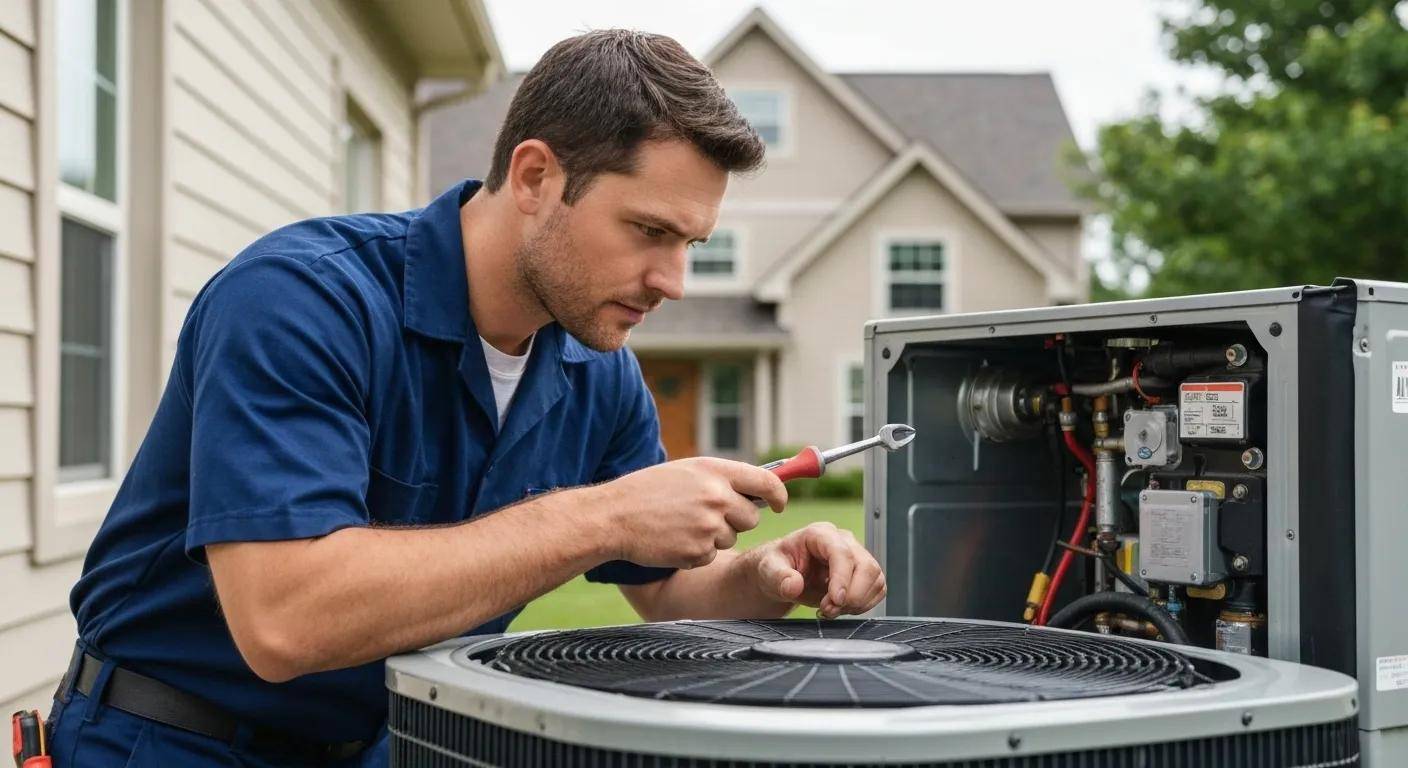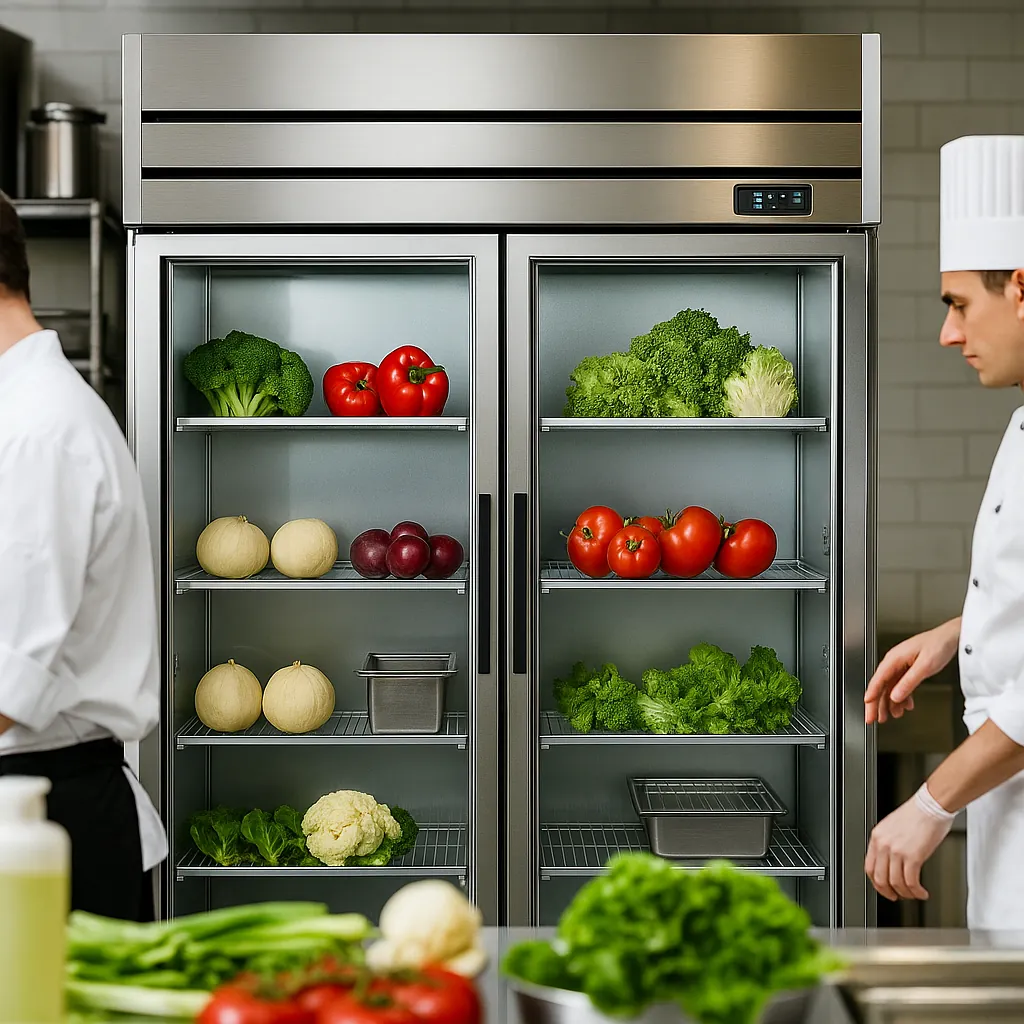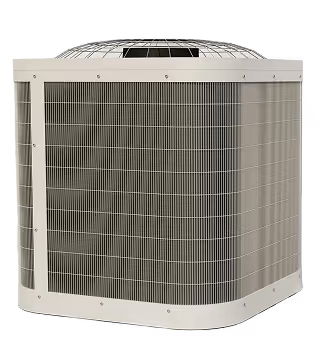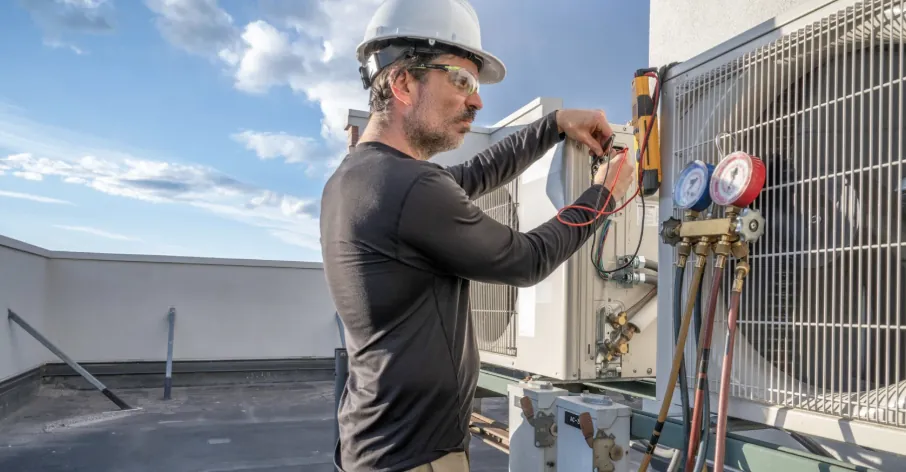
Choosing a reliable HVAC contractor in New York can save you time, money, and frustration when your air conditioning repair or residential HVAC system needs service. Homeowners and business owners face a dilemma: should they hire manufacturer-certified experts or turn to general technicians who handle multiple brands? This guide clarifies service expectations, and key decision factors so you can request accurate HVAC quotes, schedule maintenance, or call for emergency support with confidence.
You will learn how to:
- Verify New York contractor credentials.
- Identify the full spectrum of residential, commercial, and emergency services.
- Assess modern system expertise, energy-efficiency strategies, and indoor air quality solutions.
By following these insights and exploring Liberty HVACR: Home, you will feel empowered to select the ideal partner for your HVAC service needs.
What Are the Essential Qualifications for HVAC Contractors in New York?
HVAC contractor’s qualifications define their ability to install, maintain, and repair systems safely and effectively. Proper comprehensive insurance, and recognized certifications establish a contractor’s technical competence and legal compliance across New York. Understanding these credentials prevents costly mistakes and liability gaps when scheduling a routine tune-up or emergency air conditioning repair.
Which Certifications Differentiate Factory-Trained HVAC Technicians from General Technicians?
Factory-trained experts complete manufacturer-led programs that focus on brand-specific systems, advanced diagnostics, and warranty procedures.
These credentials confirm that a technician can preserve warranty conditions and deliver optimized system performance, which sets the stage for how Liberty HVACR maintains its high standards.
What Is the Difference Between Factory-Trained Experts and General HVAC Technicians?
Factory-trained experts possess targeted knowledge of specific HVAC brands, while general technicians apply broad skills across various systems. Recognizing these distinctions helps you match service to system complexity and budget priorities.
What Does “Factory-Trained” Mean for HVAC Technicians?
Factory-trained means a technician has completed a manufacturer’s official program covering system architecture, proprietary controls, and advanced troubleshooting. This specialized training ensures the technician understands component-level design and can calibrate equipment to exact factory specifications, directly enhancing diagnostic accuracy and efficiency.
What Are the Advantages of Hiring Factory-Trained HVAC Technicians?
Hiring factory-trained experts delivers five key benefits:
- Accurate Diagnostics – Specialized training unlocks deeper system insights.
- Warranty Preservation – Proper service procedures maintain manufacturer warranties.
- Efficiency Optimization – Technicians recommend upgrades and energy-saving settings.
- Access to Genuine Parts – Direct channel to OEM components for reliability.
- Advanced Troubleshooting – Faster repairs reduce downtime and service costs.
These advantages translate to long-term savings and improved system performance, informing choices about when to engage general technicians (Air Conditioning Contractors of America, 2023).
When Are General Technicians Suitable for HVAC Services?
General technicians provide efficient service for common tasks such as filter replacement, basic refrigerant top-offs, and residential heater tune-ups. They are ideal when:
- Your system is older or out of warranty.
- You need cost-effective maintenance plans.
- The service focus is routine inspection rather than brand-specific diagnostics.
In these scenarios, general technicians balance affordability with reliable support, preparing you to verify credentials effectively.
How Does Liberty HVACR’s Factory-Trained Team Provide Superior Service?
By partnering manufacturer training with in-house expertise, Liberty HVACR’s factory-trained staff delivers seamless installations, timely repairs, and proactive efficiency recommendations. This dual focus on quality and integrity elevates every service appointment, ensuring each project meets rigorous standards and exceeds customer expectations.
What Questions Should You Ask About Technician Training and Experience?
Before scheduling service, confirm that technicians:
- Have completed brand-specific factory training for your system.
- Hold EPA 608, NATE, and any relevant gas-fitting certifications.
- Provide proof of licensing and insurance for NY jurisdictions.
- Maintain records of continuing education and safety compliance.
These inquiries establish a clear picture of technical capability and legal standing, which flows naturally into credential confirmation.
How to Confirm HVAC Certifications Like EPA 608 and NATE?
You can validate EPA 608 certification by requesting a copy of the certification card and checking issuance details against the EPA online registry. For NATE certification, the technician should provide a NATE ID number that you can verify through the North American Technician Excellence website. Confirming these credentials ensures the technician meets national competency standards.
Why Is Background Checking and Licensing Important When Choosing a Contractor?
Background checks and proper licensing protect you from liability, property damage, and unqualified labor. Verified licenses indicate compliance with building codes and insurance requirements, while background checks demonstrate a commitment to safety and trust. This foundation of integrity leads directly into the range of services you should expect from a qualified contractor.
What HVAC Services Should You Expect from a Qualified Contractor in New York?
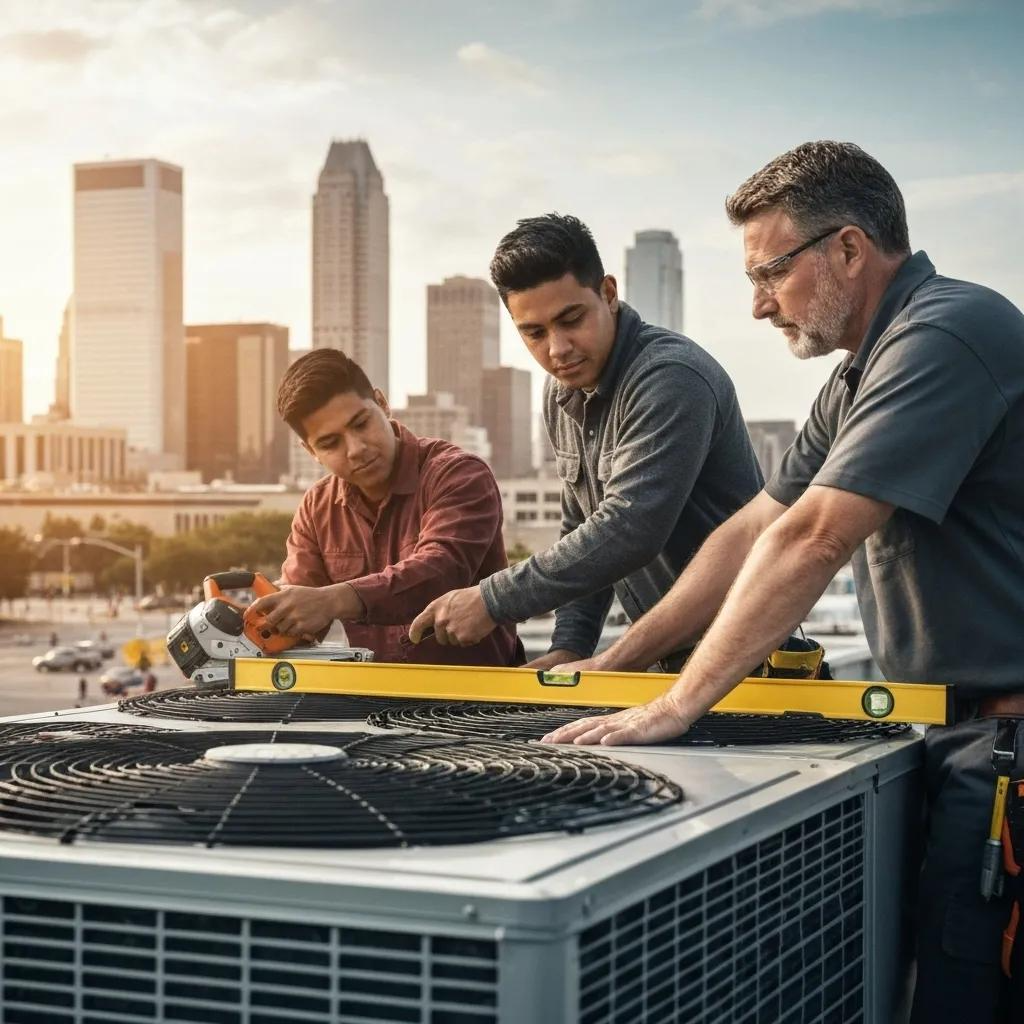
A fully qualified HVAC contractor offers comprehensive solutions for residential, commercial, emergency, and preventative needs, ensuring year-round comfort and system reliability.
Introductory overview:
- Residential HVAC Services
- Commercial HVAC Solutions
- 24/7 Emergency Repair
- Preventative Maintenance Plans
What Residential HVAC Services Are Available for Installation, Repair, and Maintenance?
Homeowners can request:
- Central air conditioning installation and air purification upgrades.
- Furnace and boiler repair with safety inspections.
- Ductless mini-split system installation in room additions.
- Seasonal tune-ups and filter replacements under service contracts.
These offerings maintain comfort, indoor air quality, and energy efficiency, leading into commercial requirements.
What Commercial HVAC Solutions Does Liberty HVACR Provide Across NY?
Businesses benefit from:
- Rooftop unit installations with load calculation design.
- VRF (Variable Refrigerant Flow) and heat exchanger services.
- Refrigeration support for restaurants and retail.
- Building automation and energy management integration.
This broad portfolio ensures operational continuity for clients, which naturally connects to emergency readiness.
How Do 24/7 Emergency HVAC Repair Services Work in the Tri-State Area?
Emergency repair combines rapid dispatch protocols, remote monitoring alerts, and mobile service fleets. When a critical failure occurs, a factory-trained technician arrives promptly with OEM parts to diagnose and restore system function, minimizing downtime for homes and businesses alike. This readiness frames the value of preventative planning.
What Are Preventative HVAC Maintenance Plans and Their Benefits?
Preventative maintenance plans bundle scheduled inspections, filter replacements, and system calibrations into an annual contract. Benefits include:
- Extended equipment lifespan.
- Reduced likelihood of breakdowns.
- Improved energy efficiency and lower utility bills.
- Priority scheduling for emergency calls.
A proactive maintenance approach safeguards performance and sets the stage for advanced system considerations.
How Do Factory-Trained Experts Handle Modern HVAC Systems and Energy Efficiency?
Factory-trained technicians stay current with evolving technologies, ensuring they can install and optimize the latest equipment to meet efficiency standards and access available rebates.
What HVAC Brands and Systems Do Factory-Trained Technicians Specialize In?
Top factory-trained experts maintain direct manufacturer partnerships to service brands such as Trane, Carrier, Lennox, Mitsubishi, and Daikin. This brand specialization ensures installers and repair technicians follow precise guidelines for component compatibility and warranty integrity.
How Do Heat Pump Installation and Repair Benefit from Factory Training?
Factory training in heat pumps covers refrigerant-to-compressor ratios, advanced inverter controls, and defrost cycle optimization. Technicians apply manufacturer protocols to enhance coefficient of performance (COP) and secure incentives under the Inflation Reduction Act, translating to immediate utility savings.
What Are the Latest Energy Efficiency Technologies and Rebates Available?
Emerging technologies include smart thermostat integration, variable-speed compressor systems, and advanced zoning controls. Rebate programs through NYSERDA and federal tax credits under the Inflation Reduction Act can cover up to 30% of system costs when installed by certified professionals, making upgrades financially attractive.
How Can Indoor Air Quality Solutions Improve Your Home or Business?
Indoor air quality services encompass MERV-rated filter upgrades, UV-C germicidal installations, and ERV (Energy Recovery Ventilator) systems. These solutions reduce allergens, inhibit airborne pathogens, and balance humidity, directly enhancing occupant health and comfort.
What Are the Key Factors to Consider When Choosing the Best HVAC Contractor in New York?
Selecting the right contractor involves evaluating reputation, warranty policies, transparent pricing, and trust indicators that ensure quality outcomes.
What Should You Look for in an HVAC Contractor’s Reputation and Customer Reviews?
Seek contractors with consistent 4- to 5-star ratings across platforms and detailed feedback on technician professionalism and on-time performance. Verified testimonials offer insights into real-world project results, guiding your contractor choice toward proven reliability.
How Do HVAC Warranties Work and Why Do They Matter?
HVAC warranties cover parts, labor, and sometimes system performance guarantees. Manufacturer-backed warranties often require factory-trained service to remain valid. Understanding warranty terms protects you from unexpected repair costs and ensures manufacturer support when issues arise.
What Are the Typical Pricing and Service Guarantees to Expect?
Transparent contractors provide itemized estimates for parts, labor, and markup with clear guarantees on repair timelines or replacement commitments. Request written service agreements that define response times for emergency calls and outline coverage details to prevent surprise charges.
How Does Liberty HVACR Build Trust Through Quality and Integrity?
Liberty HVACR upholds trust by offering upfront quotes, maintaining certified staff, honoring warranty conditions, and conducting thorough safety inspections. This commitment to transparency and craftsmanship cements long-term customer relationships, leading into the final step of direct contractor engagement.
What Are the Most Important Questions to Ask Your HVAC Contractor Before Hiring?
Before signing a service agreement or scheduling a full installation, ensure your contractor meets technical, legal, and organizational standards that align with your project scope.
Which Questions Should You Ask About Technician Expertise and Certifications?
Confirm that technicians:
- Are factory-trained on your system’s brand and model.
- Hold current EPA 608 and NATE certifications.
- Undergo background checks and periodic safety training.
These criteria guarantee skilled service and secure workplace practices.
What Should You Know About Service Scope, Emergency Support, and Pricing?
Clarify the scope of work, response times for urgent calls, cancellation policies, and payment terms. Inquire about emergency surcharges and request a written summary of inclusions and exclusions to avoid hidden fees.
How Can You Ensure Your HVAC Contractor Meets Local Regulations and Standards?
Ask for copies of municipal or state contractor licenses, certificates of insurance, and bonding documents. Verify license numbers on official state or local government websites to confirm active good-standing status before authorizing any work.
Selecting the best HVAC contractor in New York empowers you to maintain comfortable indoor environments, optimize energy use, and protect your investment. By assessing licenses, certifications, service offerings, and trust signals—and by choosing between factory-trained experts and general technicians—you can schedule service appointments, request a free quote, or call for immediate HVAC support with full confidence in your contractor’s ability to deliver top-quality results.
Why Call a Professional?
Don’t wait for a minor issue to become a major hassle. If you notice any of these signs, schedule a professional repair service to keep your appliances running smoothly and efficiently.

.avif)
